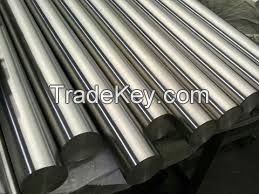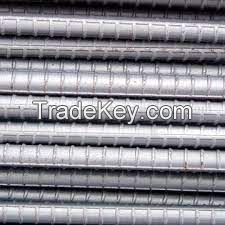

FOB Price
Get Latest Price380 ~ 400 USD / ( Negotiable )
|50 Ton Minimum Order
Country:
Philippines
Model No:
HRB400 HRB500
FOB Price:
380 ~ 400 USD / ( Negotiable ) Get Latest Price
Place of Origin:
PHILIPPINES
Price for Minimum Order:
380
Minimum Order Quantity:
50 Ton
Packaging Detail:
BUYER REQUEST
Delivery Time:
7-21 DAYS
Supplying Ability:
260000
Payment Type:
T/T, Western Union, Money Gram
Product Group :
-
Stainless Steel
Rebar
. Stainless Steel Rebar: This high-end type of rebar is made from
stainless steel, offering superior corrosion resistance and
strength. It is used in highly demanding environments, including
underwater structures, industrial plants, and places with extreme
exposure to corrosive substances.
6. Composite Rebar: Made from materials like fiberglass or carbon
fiber, composite rebar is used in specific applications where
traditional steel rebar may not be suitable. These are lighter and
resistant to corrosion but are more expensive.
Benefits of Concrete Steel:
Enhanced Strength: The addition of concrete steel to a concrete
structure provides significant improvement in its strength,
especially in tension. Concrete can handle compressive forces, but
it is the reinforcing steel that allows the concrete to handle
tensile and shear stresses.
Durability: Reinforced concrete structures with concrete steel are
highly durable and can withstand heavy loads, vibrations, and
natural forces, making them long-lasting and safe.
Corrosion Resistance: Depending on the coating (e.g., galvanized or
epoxy-coated), concrete steel can be resistant to corrosion,
extending the lifespan of the structure.
Versatility: Concrete steel can be formed into various shapes and
sizes to suit different types of construction projects, offering
flexibility in design and application.
Cost-Effective: Reinforced concrete is often more cost-effective
than using other materials like steel beams, as concrete is
cheaper, and steel reinforcement significantly increases its
strength.
Drawbacks:
Corrosion: Unprotected concrete steel (e.g., uncoated rebar) is
vulnerable to corrosion when exposed to moisture, salt, or
chemicals, which can weaken the structure over time.
Brittleness: Concrete, by nature, can be brittle under certain
circumstances, and if there is any failure or cracking in the
concrete, it could lead to issues with the steel reinforcement as
well.
Labor-Intensive Installation: The placement and tying of rebar in
concrete construction require skilled labor, which can add to the
overall time and cost of the project.
Weight: Concrete steel adds significant weight to structures, which
may require additional consideration in the design phase,
especially for high-rise buildings or structures with specific
weight limits.
Summary:
Concrete steel (reinforcing steel or rebar) is essential for
reinforcing concrete structures, providing strength to handle
tension, shear, and other forces that concrete alone cannot manage.
Available in different forms such as hot-rolled, galvanized, or
stainless steel, it is used across various industries, including
construction, transportation, marine, and infrastructure. The use
of concrete steel enhances the durability, stability, and longevity
of concrete structures, making them capable of withstanding extreme
conditions while maintaining their integrity over time.

| Country: | Philippines |
| Model No: | HRB400 HRB500 |
| FOB Price: | 380 ~ 400 / ( Negotiable ) Get Latest Price |
| Place of Origin: | PHILIPPINES |
| Price for Minimum Order: | 380 |
| Minimum Order Quantity: | 50 Ton |
| Packaging Detail: | BUYER REQUEST |
| Delivery Time: | 7-21 DAYS |
| Supplying Ability: | 260000 |
| Payment Type: | T/T, Western Union, Money Gram |
| Product Group : | - |
